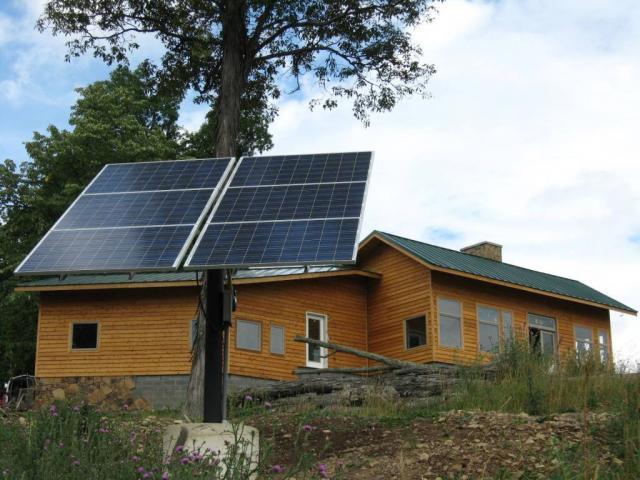Late Spring/Early Summer Maintenance Checklist for Off-Gridders

The cold days of winter are now safely behind us, which means we can finally begin tackling some home maintenance projects we may have been putting off due to cooler temperatures. Now, in the wake of the COVID-19 crisis, I, Matthew Davies, suggest you get your to-do list finished before you have to return to work.
This to-do list is unique in that it is designed for people living off the grid. Because no two off-grid homes are precisely the same, not all items on the list may apply. Nevertheless, now is the time to get out there and see what damage mother nature did to your homestead this winter and make needed repairs.
Below are some common repairs that you should address annually, around this time of the year.
Adjust Solar Panels
During the winter, you need to adjust your solar panels to capture the most daylight possible. That can leave you with less light-capturing during the other months of the year. I suggest you get up on the roof and adjust your panels to harness more of the sun’s power in the summer months.
Make sure when you are adjusting the solar panels that you take all safety precautions necessary. In the spring, roofs can become slippery due to condensation and/or rain. Additionally, follow the manufacturer’s instructions for adjusting your panels. They are too expensive to damage, and you don’t want to have to replace them.
Tune-Up Your Generator
During the summer months, your generator will not likely get much use. Even if you have a day or two of rain, your batteries should store more than enough for you to operate at a diminished capacity. For this reason, summer is the perfect time to get that generator in tip-top shape.
For this, you have one of two options. If you are mechanically inclined, you are more than welcome to try tuning it up yourself. If you are not or would prefer someone else to do it, you can call a professional. Either way, I highly recommend taking care of this in the summer if you intend to use it this winter.
Check External Water Pipes and Pumps
During the winter months, water that is in pipes that don’t get a lot of use tends to solidify. Depending on the amount of water in the line, this can lead to cracks or breaks. While I am not suggesting that you dig up your entire water system, I am suggesting you look where it comes out of the ground. These are the weak points of you your system.
While you are touring the property, take a few extra minutes to look at and listen to your pumps. Cycle them once. Listen to the sound they are making. If they sound ok, then you are good to go. If they make a grinding sound or no sound at all, you are going to need to repair or replace them.
Sweep the Chimney(s)
Whether you are burning wood or pellets, the chimney has a way of clogging up. The reason it does this is that the wood is not burning hot enough. It leaves creosote (or soot) that becomes dangerous. The residue is still as flammable as the wood you are burning. When it gets to the right temperature, it will ignite and burn very hot. When you hear of people having a chimney fire, this is the cause of that fire.
To prevent this from happening, you can do one of two things. The first thing you can do is burn your fire hot enough to clear that out. However, this usually ends up overheating the house. It is also a waste of fuel. Second, you can sweep your chimney every year. Doing this will prevent the dreaded chimney fire from happening in the first place.
Check Your Batteries
The number one reason batteries die is because they don’t have enough water in them. Take a few minutes to top off your batteries with distilled water. As a reminder, only distilled water will do. Any other water can have impurities or metals in it that will destroy your cells the first time you attempt to charge them.
Speaking of, top up your batteries and fully use them once during the summer months. Doing so will allow you to see if you have any dead batteries. Better to find out now than in the middle of winter. There is nothing worse than having to fix the battery bank in snow and ice.
Pump the Septic Tank
While most septic tanks do not need to be pumped every year, I have always made a habit of doing this every summer. The reason I do is that I never want to forget the last time I had it cleaned. I have seen what a backed-up septic line can do to a house. That is not a risk I am willing to take.
Take Your Compost Bin Outside
Let’s face it. No one likes to go outside in the winter. If you are like me, you keep your compost bin inside during the winter. I want to have it easily accessible all year long. In the spring, I will set it outside. When I do this, it allows the compost to start breaking down so I can use it in my garden.
Speaking of the garden, don’t forget to get your seedlings started and put up in your window. Use the compost at the top before turning it under. You should only need a small amount.
Conclusion
I, Matthew Davies, hope that you have found this list helpful. Remember, completing your maintenance list early enough in the warmer season means you can enjoy your summer. It doesn’t take long if you get the entire family involved. Hand out a few tasks to everyone, and before you know it, you will be enjoying a drink on the back porch. I wish you all the best this summer.